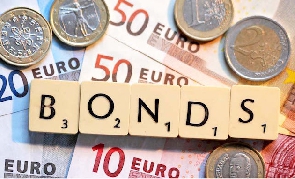The nation’s Eurobond prices recorded significant gains following the news that a staff-level agreement with the International Monetary Fund (IMF) on a three-year Extended Credit Facility (ECF) arrangement worth around US$3billion, or SDR 2.242 billion has been reached.
This development comes on the back of similar positives that have seen both debt instruments – which were trading at distressed levels – and the local currency appreciate on account of the announcement of concrete measures aimed at debt sustainability.
RMB Research, in its observation of the market following the SLA announcement said: “As was to be expected, Ghanaian Eurobonds rallied on the back of the news. Ghana’s 2027 Eurobond gained in excess of 7 percent on the session to outperform its peers”.
The market watchers also noted that Ghana’s bonds were primed to benefit from the recent US inflation, which rose at a lower-than-expected rate for a second straight month in November and recorded its smallest annual increase in inflation for nearly a year by 0.1 percent; leading to market expectations that the Federal Reserve will retreat on its hawkish stance.
“It must be noted, however, that Ghanaian bonds would have also found support from the weaker-than-expected US CPI data, which bolstered bets for the FOMC to scale back its pace of monetary policy tightening.”
Ahead of this rally, the local currency had been on a recovery from months of depreciation against the American greenback and other major trading currencies, following the announcement by government of embarking on a debt exchange – a notable prior action for the Fund’s assistance. This seems to have given the local currency a tail-wind that could prolong the cedi’s resilience through December 2022.
In an earlier note, RMB had backed the cedi to maintain its run – arguing that optimism was returning and the local unit was undervalued.
“The Ghanaian cedi remained the star performer in the Africa FX complex on Monday… The recent cedi rally has seen traders in the derivatives market pare back their bets for depreciation in the months ahead. The 3-, 6- and 12-month non-deliverable forward outright have trended lower in recent sessions.
“From a valuation point of view, the cedi is deeply undervalued on a real effective exchange rate basis. This suggests that there is room for the currency to appreciate in the coming months, should Ghana’s macroeconomic backdrop improve meaningfully,” it noted.
In a statement, the IMF said government’s strong reform programme aims to restore macroeconomic stability and debt sustainability while protecting the vulnerable, preserving financial stability, and laying the foundation for a strong and inclusive recovery.
IMF deal
Although the SLA won’t become legally enforceable until it gains Management and Executive Board approval, it is a significant sign of both parties’ commitment to implementing the suggested economic programme to alleviate the nation’s economic problems.
The Fund, in a statement, indicated that this initial agreement on the economic programme will restore macroeconomic stability and debt sustainability while laying the foundation for stronger and more inclusive growth. Key reforms are aimed at ensuring sustainability of public finances while protecting the vulnerable. The fiscal strategy relies on frontloaded measures to increase domestic resource mobilisation and streamline expenditure.
However, receipt of the necessary financing assurances from Ghana’s partners and creditors remains essential to IMF Management and Executive Board approval, following this staff-level agreement. Also, sufficient progress on the debt exchange front will be needed before the proposed Fund-supported programme can be presented to the IMF Executive Board for approval.
Currently, the Debt Sustainability Analysis (DSA) demonstrates that the country’s debt servicing absorbs more than half of total government revenues and almost 70 percent of tax revenues. Additionally, the total public debt stock, including that of state-owned enterprises among others, exceeds 100 percent of the gross domestic product (GDP).
Under the arrangement, government proposes to exchange existing domestic bonds as of December 1, 2022 for four new bonds maturing in 2027, 2029, 2032 and 2037. These new instruments will pay no interest in 2023, 5 percent interest in 2024 and subsequently 10 percent interest per annum until maturity. The predetermined allocation ratios are 17 percent for short-term bonds, 17 percent for intermediate bonds, 25 percent for medium-term bonds and 41 percent for long-term bonds.
This, when completed, will afford government some fiscal space to operate as it envisages reducing, particularly, the domestic interest cost in 2023 – which is estimated at GH¢31.29billion out of the total GH¢52.55billion.
Business News of Thursday, 15 December 2022
Source: thebftonline.com

















